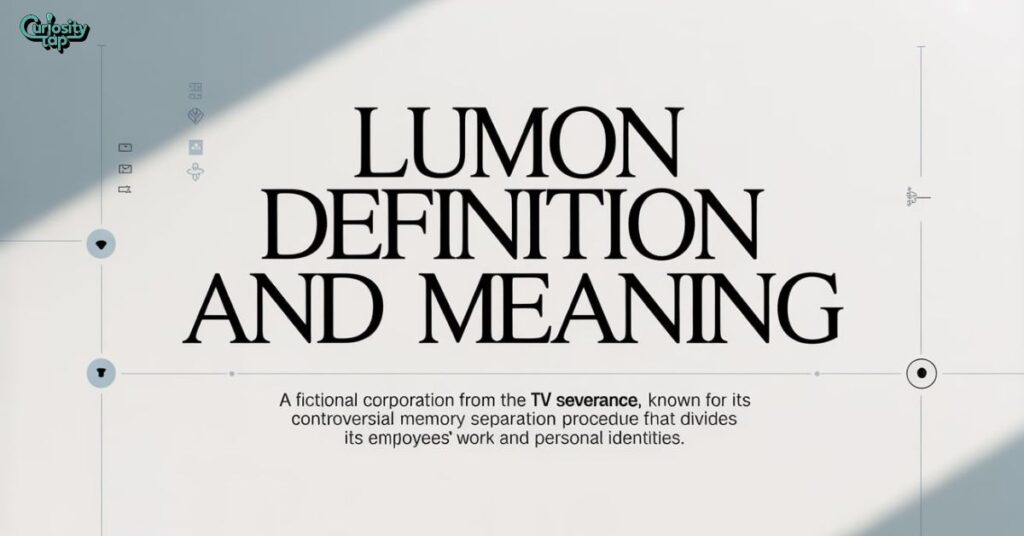When we encounter new terms, it’s fascinating to explore their meanings, origins, and cultural implications.
One such term that has gained traction in recent discussions, especially in the context of modern media, is Lumon.
This article aims to unpack the Lumon definition, its meaning in various contexts, and how it resonates within cultural and corporate landscapes.
Origin and Etymology of “Lumon”
The etymology of Lumon traces back to the Latin word lumen, meaning “light.” This root sets the stage for understanding the term’s connotations of illumination, brilliance, and enlightenment.
The suffix “-on,” often used in branding, suggests a synthetic or modern twist, creating a neologism that evokes a sense of innovation and futuristic appeal.
Key Etymological Roots
| Term | Meaning | Origin |
|---|---|---|
| Lumen | Light | Latin |
| -on | Suffix indicating a modern or brand name | Various languages |
This combination reflects a broader trend in corporate branding, where companies often utilize elements of light symbolism to project clarity and efficiency.
Also Read: Office Avstarnews: The Ultimate Solution For Office Management
What Does “Lumon” Mean in Modern Usage?
In contemporary settings, especially within corporate and creative contexts, the Lumon meaning has evolved. It often symbolizes corporate identity, encapsulating notions of mechanical efficiency and cold professionalism.
This portrayal aligns well with the aesthetics often found in dystopian narratives and futuristic imagery, where companies seek to portray themselves as tech-forward and innovative.
Modern Contexts of Usage
- Corporate Branding: Used by companies to signify clarity and innovation.
- Digital Slang: In social media and online communities, it can represent a polished, professional tone.
- Fictional Worlds: Particularly in series like Severance (Apple TV+), it embodies the concept of a corporate dystopia.
Cultural and Symbolic Associations
The term “Lumon” carries significant cultural weight. In many ways, it reflects societal attitudes towards corporate environments and the implications of ideological commitment.
Cultural Significance
- Light Symbolism: Represents hope and clarity, often juxtaposed against darker themes in dystopian fiction.
- Spiritual Undertones: Suggests a quest for enlightenment in a world often described as synthetic or devoid of genuine emotional connection.
Connotations and Tone of “Lumon”
Understanding the connotations of Lumon helps clarify its usage. Depending on the context, it can evoke:
- Positive Connotations: Clarity, innovation, and enlightenment.
- Negative Connotations: Coldness, rigidity, and cult-like behavior.
This variability underscores the importance of context in determining the tone.
For instance, in a marketing campaign, Lumon might project a sleek, modern image, while in a critique of corporate culture, it could symbolize the loss of humanity in business practices.
Polite and Professional Alternatives
If you’re looking to communicate similar ideas without using “Lumon,” consider these alternatives:
- Illumination: Evokes a sense of clarity and understanding.
- Brilliance: Suggests excellence and high quality.
- Clarity: Directly implies straightforwardness and transparency.
Using these alternatives can help you maintain a professional tone while avoiding overly polished branding.
When to Use “Lumon”
Applying the term “Lumon” effectively requires awareness of the context. Here are some appropriate scenarios:
- Corporate Communications: When discussing branding strategies or corporate identity.
- Creative Writing: In speculative fiction or discussions of dystopian themes.
- Cultural Commentary: Analyzing the impact of corporate culture on society.
When Not to Use “Lumon”
Conversely, there are contexts where “Lumon” may not be suitable:
- Informal Settings: Using it in casual conversation might come off as pretentious.
- Academic Writing: Unless specifically discussing corporate branding, it may not fit well.
Also Read: Diving Into SFFAREHockey Statistics Yesterday: A Comprehensive Analysis
Practical Examples of “Lumon” in Context
To better understand how “Lumon” functions in language, let’s explore some practical examples:
- In a Corporate Meeting: “To enhance our Lumon technology, we must focus on sustainable practices.”
- In Creative Writing: “The characters navigated through a Lumon chamber, a space that epitomized the cold professionalism of their corporate overlords.”
- In Cultural Critique: “The series Severance effectively critiques the Lumon mindset that prioritizes productivity over personal well-being.”
These examples highlight the versatility and depth of the term.
Comparisons With Similar Words
Understanding Lumon also benefits from comparing it with similar terms. Here’s a brief comparison:
| Word | Connotation | Contextual Use |
|---|---|---|
| Luminous | Positive, bright | Artistic contexts, discussions of beauty |
| Lexon | Neutral, modern | Branding, tech contexts |
| Xenon | Technical, scientific | Discussions on technology and innovation |
This comparison illustrates how nuanced language can be and how context-dependent semantics play a crucial role.
FAQs
What is the Lumon Definition in Modern Contexts?
The Lumon definition encompasses its meanings in various fields, particularly in corporate branding and cultural discussions. It symbolizes clarity, efficiency, and sometimes even a critique of modern corporate culture.
How Does the Lumon Meaning Relate to Dystopian Themes?
The Lumon meaning often intersects with dystopian narratives, particularly in series like Severance. It reflects the cold professionalism and ideological commitment of corporate environments, serving as a commentary on modern society.
What Are Common Associations with Lumon Branding?
Lumon branding frequently evokes imagery of light, innovation, and polished professionalism. However, it can also symbolize the darker aspects of corporate culture, highlighting the tension between clarity and coldness.
When Is It Appropriate to Use the Term Lumon?
Knowing when to use Lumon is crucial. It fits well in corporate communications, creative writing, and cultural critiques, but should be avoided in casual or informal settings to prevent sounding pretentious.
How Can I Explore the Etymology of Lumon?
Understanding the etymology of Lumon involves tracing its roots to the Latin word lumen, meaning light. This connection enriches its meanings and offers insights into how language evolves within corporate and cultural contexts.
Final Thoughts
In summary, the term Lumon encapsulates a rich tapestry of meanings and associations.
It serves as a lens through which we can examine modern corporate culture, language evolution, and the interplay of light and darkness in both literal and metaphorical senses.
By understanding its etymology, cultural significance, and appropriate usage, we can more effectively engage with the term in various contexts.
Whether you’re crafting a corporate message or diving into creative writing, being aware of the Lumon definition and its implications will enhance your communication skills. As language continues to evolve, staying attuned to these changes will ensure your expression remains relevant and impactful.
The exploration of Lumon not only sheds light on modern linguistics but also invites reflection on our relationship with technology and the narratives we construct around it.
So, next time you encounter Lumon, think about the layers of meaning it carries and how you can use it to enrich your own communication.
Read more knowledgeable blogs on Curiosity Tap
Is this article helpful?

Jackson Pearson is a passionate educator and language enthusiast behind the blog Jackson Pearson. With years of experience in teaching and writing, he specializes in simplifying complex grammar rules, breaking down tricky vocabulary, and crafting learning guides that are both engaging and practical. His mission is to help readers boost their English skills whether they’re beginners or brushing up for fluency. Through every article, Jackson brings clarity, structure, and a spark of curiosity to the world of English learning.



